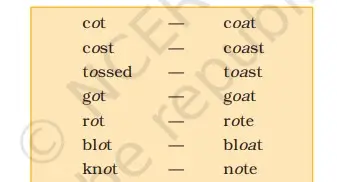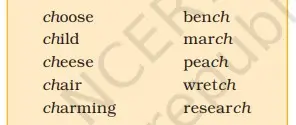Bihar Board Class 7 English Chapter 9 Solutions is available for free here. It covers all question answers of chapter 9 – “Quality”, from the new book – Honeycomb.
“Quality” is a touching story by John Galsworthy about two German brothers who make beautiful handmade shoes. The brothers care deeply about their craft and refuse to make lower quality shoes, even when cheaper factory-made shoes become popular. This chapter teaches students about the importance of taking pride in your work and not giving up on your values. On this page, you will get solutions for Chapter 9 – Quality from Bihar Board Class 7 English Book.

Bihar Board Class 7 English Chapter 9 Solutions –
Contents
| Class | 7 |
| Subject | English (Honeycomb) |
| Chapter | 9. Quality |
| Board | Bihar Board |
WORKING WITH THE TEXT
Answer the following questions.
1. What was the author’s opinion about Mr Gessler as a bootmaker?
Ans: The author thought Mr Gessler was an excellent bootmaker. The boots made by Mr Gessler fit perfectly. They were custom-made with the best materials and lasted for a very long time. The author was very impressed with Mr Gessler’s work.
2. Why did the author visit the shop so infrequently?
Ans: The author visited the shop very rarely because the boots made by Mr Gessler lasted for a very long time. They were not like normal boots that wear out quickly. Each pair was so well-made that the author didn’t need to buy new ones often.
3. What was the effect on Mr Gessler of the author’s remark about a certain pair of boots?
Ans: When the author complained about a pair of boots, Mr Gessler looked at him silently for some time, as if he couldn’t believe what he heard. Then he suggested that perhaps the boots had gotten wet. He asked the author to bring them back so he could either fix them or adjust the price in the bill. This shows how seriously Mr Gessler took the quality of his work.
4. What was Mr Gessler’s complaint against “big firms”?
Ans: Mr Gessler complained that big companies didn’t care about giving customers value for their money. These companies were getting business through advertisements rather than through good quality work. Because of these big firms, Mr Gessler was getting less and less work, and his business was suffering.
5. Why did the author order so many pairs of boots? Did he really need them?
Ans: No, the author didn’t really need so many pairs of boots. He ordered them because he wanted to help Mr Gessler financially. The author could see that Mr Gessler was struggling to make a living, so he ordered extra boots as a way to support the old bootmaker.
Working with Language
1. Study the following phrases and their meanings. Use them appropriately to complete the sentences that follow.
- look after: take care of
- look down: disapprove or regard as inferior
- look in: make a short visit (on someone)
- look into: investigate
- look out: be careful
- look up: improve
- look up to: admire
(i) After a very long spell of heat, the weather is __________ at last.
Ans: After a very long spell of heat, the weather is looking up at last.
(ii) We have no right to __________ people who do small jobs.
Ans: We have no right to look down on people who do small jobs.
(iii) Nitin has always __________ his uncle, who is a self-made man.
Ans: Nitin has always looked up to his uncle, who is a self-made man.
(iv) The police are __________ the matter thoroughly.
Ans: The police are looking into the matter thoroughly.
(v) If you want to go out. I will __________ the children for you.
Ans: If you want to go out. I will look after the children for you.
(vi) I promise to __________ on your brother when I visit Lucknow next.
Ans: I promise to look in on your brother when I visit Lucknow next.
(vi) __________ when you are crossing the main road.
Ans: Look out when you are crossing the main road.
2. Read the following sets of words loudly and clearly.

Ans: Please do by yourself.
3. Each of the following words contains the sound ‘sh’ (as in shine) in the beginning or in the middle or at the end. First speak out all the words clearly. Then arrange the words in three groups in the table on page 81.

Ans:
| Initial | Medial | Final |
|---|---|---|
| Sheep | Fashion | Trash |
| Shriek | Ashes | Fish |
| Shoe | Pushing | Marsh |
| Shore | Moustache | Polish |
| Sure | Portion | |
| Nation | ||
| Anxious |
4. In each of the following words ‘ch’ represents the same consonant sound as in ‘chair’. The words on the left have this sound initially. Those on the right have it finally. Speak each word clearly.
Ans: Please do by yourself.

Underline the letters representing this sound in each of the following words:
(i) Feature
Ans: Feature
(ii) Archery
Ans: Archery
(iii) Picture
Ans: Picture
(iv) Reaching
Ans: Reaching
(v) Nature
Ans: Nature
(vi) Matches
Ans: Matches
(vii) Riches
Ans: Riches
(viii) Batch
Ans: Batch
(ix) Church
Ans: Church
Speaking
1. Do you think Mr Gessler was a failure as a bootmaker or as a competitive businessman?
Ans: Mr Gessler was an excellent bootmaker. His customers were very happy with the quality of his boots. However, he failed as a businessman because he couldn’t compete with bigger companies. He didn’t have money for advertisements, and he spent all his earnings on good materials and rent. He was great at making boots but not good at running a business in the modern world.
2. What is the significance of the title? To whom or to what does it refer?
Ans: The title “Quality” refers to the excellent quality of boots that Mr Gessler made. The title shows how important good craftsmanship is. It shows that Mr Gessler cared more about making perfect boots than making money. Even when cheaper boots were available in the market, he stayed committed to quality work.
3. Notice the way Mr Gessler speaks English. His English is influenced by his mother tongue. He speaks English with an accent.
When Mr Gessler speaks, p, t, k sound like b, d, g. Can you say these words as Mr Gessler would say them? “It comes and never stops. Does it bother me? Not at all. Ask my brother, please.”
Ans: Mr Gessler’s accent makes his English sound different. When he speaks, certain sounds change, which can sound unusual to us.
The way Mr Gessler would say: “Id comes and never sdobs. Does id bother me? Nod ad all. Asg my broder, blease.”
4. Speak to five adults in your neighbourhood. Ask them the following questions (in any language they are comfortable in). Then come back and share your findings with the class.
Ans: Please do by yourself.
5. Let pairs of students talk to each other about leaving the country. One student repeats Ajit’s statement. The other gives a reason for not agreeing with Ajit. The sentence openings given below should be used.
(i) If I leave this country, I’ll miss…
(ii) There are some things which you can get only here, for example…
(iii) There are some special days I’ll miss, particularly…
(iv) Most of all I’ll miss…because…
(v) I think it’s impossible for me to leave my country because…
(vi) How can you leave your own country except when…?
(vii) Depends on one’s intention. I can’t leave for good because…
(viii) Maybe for a couple of years..
Ans:
(i) If I leave this country, I’ll miss my friends who I’ve played with and spent so much time with.
(ii) There are some things which you can get only here, for example, our local food, our festivals, and our way of life.
(iii) There are some special days I’ll miss, particularly festivals like Holi and Diwali when the whole family comes together.
(iv) Most of all, I’ll miss my younger brother because we do everything together and share all our secrets.
(v) I think it’s impossible for me to leave my country because I am too attached to my family, friends, and our traditions.
(vi) How can you leave your own country except when you have no other choice or when you really need to go?
(vii) Depends on why you want to go. I can’t leave for good because I can’t imagine living far away from my loved ones forever.
(viii) Maybe for a couple of years I could manage, but I would want to come back home after my studies.
Writing
Based on the following points write a story.
- Your aunt has gone to her mother’s house.
- Your uncle does his cooking.
- He is absent-minded.
- He puts vegetables on the stove.
- He begins to clean his bicycle outside.
- The neighbour calls out saying something is burning.
- Your uncle rushes to the kitchen.
- To save vegetables, he puts some oil on them.
- Unfortunately, it’s machine oil, not cooking oil.
- What do you think happens to the vegetables?
Ans:
Title – The Cooking Disaster
My aunt had gone to visit her mother for a few days, leaving my uncle alone at home. My uncle, who rarely cooked, decided to make dinner for himself.
The problem was that my uncle was very absent-minded. One evening, he put some vegetables on the stove to cook and then went outside to clean his bicycle. He completely forgot about the food cooking in the kitchen.
While he was busy cleaning his bicycle, he got so involved that he didn’t notice the smoke coming from the kitchen window. Luckily, his neighbor saw the smoke and called out loudly, “Something is burning in your kitchen!”
My uncle dropped his cleaning cloth and rushed to the kitchen. The vegetables in the pan were almost burnt. To save them, he quickly grabbed a bottle of oil from the shelf and poured some on the vegetables.
Unfortunately, in his hurry, he had picked up the wrong bottle. Instead of cooking oil, he had poured machine oil – the oil he used for his bicycle – into the food!
The vegetables were completely ruined. Not only were they half-burnt, but now they were also covered in machine oil, which is not edible and can make people sick. My uncle had to throw away the whole dish and order food from a nearby restaurant.
When my aunt returned home and heard about this cooking disaster, she couldn’t stop laughing. From that day on, whenever my uncle offers to cook, my aunt jokingly asks, “With cooking oil or machine oil?”
